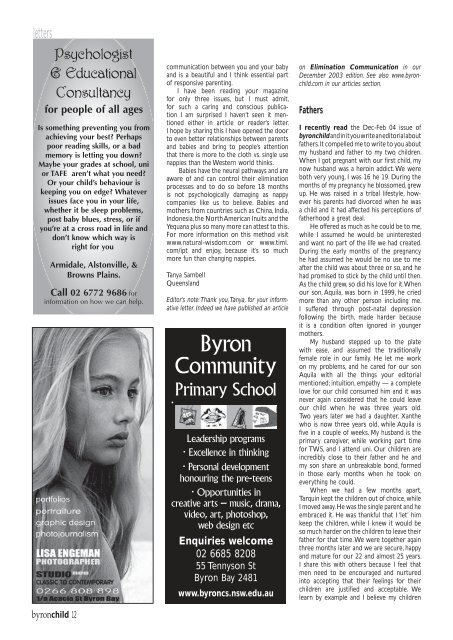byronchild - logo
byronchild - logo
byronchild - logo
You also want an ePaper? Increase the reach of your titles
YUMPU automatically turns print PDFs into web optimized ePapers that Google loves.
letters<br />
Psychologist<br />
& Educational<br />
Consultancy<br />
for people of all ages<br />
Is something preventing you from<br />
achieving your best? Perhaps<br />
poor reading skills, or a bad<br />
memory is letting you down?<br />
Maybe your grades at school, uni<br />
or TAFE aren’t what you need?<br />
Or your child’s behaviour is<br />
keeping you on edge? Whatever<br />
issues face you in your life,<br />
whether it be sleep problems,<br />
post baby blues, stress, or if<br />
you’re at a cross road in life and<br />
don’t know which way is<br />
right for you<br />
Armidale, Alstonville, &<br />
Browns Plains.<br />
Call 02 6772 9686 for<br />
information on how we can help.<br />
<strong>byronchild</strong> 12<br />
communication between you and your baby<br />
and is a beautiful and I think essential part<br />
of responsive parenting.<br />
I have been reading your magazine<br />
for only three issues, but I must admit,<br />
for such a caring and conscious publication<br />
I am surprised I haven’t seen it mentioned<br />
either in article or reader’s letter.<br />
I hope by sharing this I have opened the door<br />
to even better relationships between parents<br />
and babies and bring to people’s attention<br />
that there is more to the cloth vs. single use<br />
nappies than the Western world thinks.<br />
Babies have the neural pathways and are<br />
aware of and can control their elimination<br />
processes and to do so before 18 months<br />
is not psychologically damaging as nappy<br />
companies like us to believe. Babies and<br />
mothers from countries such as China, India,<br />
Indonesia, the North American Inuits and the<br />
Yequana plus so many more can attest to this.<br />
For more information on this method visit<br />
www.natural-wisdom.com or www.timl.<br />
com/ipt and enjoy, because it’s so much<br />
more fun than changing nappies.<br />
Tanya Sambell<br />
Queensland<br />
Editor’s note: Thank you, Tanya, for your informative<br />
letter. Indeed we have published an article<br />
Byron<br />
Community<br />
Primary School<br />
•<br />
Leadership programs<br />
• Excellence in thinking<br />
• Personal development<br />
honouring the pre-teens<br />
• Opportunities in<br />
creative arts — music, drama,<br />
video, art, photoshop,<br />
web design etc<br />
Enquiries welcome<br />
02 6685 8208<br />
55 Tennyson St<br />
Byron Bay 2481<br />
www.byroncs.nsw.edu.au<br />
on Elimination Communication in our<br />
December 2003 edition. See also www.<strong>byronchild</strong>.com<br />
in our articles section.<br />
Fathers<br />
I recently read the Dec-Feb 04 issue of<br />
<strong>byronchild</strong> and in it you write an editorial about<br />
fathers. It compelled me to write to you about<br />
my husband and father to my two children.<br />
When I got pregnant with our first child, my<br />
now husband was a heroin addict. We were<br />
both very young, I was 16 he 19. During the<br />
months of my pregnancy he blossomed, grew<br />
up. He was raised in a tribal lifestyle, however<br />
his parents had divorced when he was<br />
a child and it had affected his perceptions of<br />
fatherhood a great deal.<br />
He offered as much as he could be to me,<br />
while I assumed he would be uninterested<br />
and want no part of the life we had created.<br />
During the early months of the pregnancy<br />
he had assumed he would be no use to me<br />
after the child was about three or so, and he<br />
had promised to stick by the child until then.<br />
As the child grew, so did his love for it. When<br />
our son, Aquila, was born in 1999, he cried<br />
more than any other person including me.<br />
I suffered through post-natal depression<br />
following the birth, made harder because<br />
it is a condition often ignored in younger<br />
mothers.<br />
My husband stepped up to the plate<br />
with ease, and assumed the traditionally<br />
female role in our family. He let me work<br />
on my problems, and he cared for our son<br />
Aquila with all the things your editorial<br />
mentioned; intuition, empathy — a complete<br />
love for our child consumed him and it was<br />
never again considered that he could leave<br />
our child when he was three years old.<br />
Two years later we had a daughter, Xanthe<br />
who is now three years old, while Aquila is<br />
five in a couple of weeks. My husband is the<br />
primary caregiver, while working part time<br />
for TWS, and I attend uni. Our children are<br />
incredibly close to their father and he and<br />
my son share an unbreakable bond, formed<br />
in those early months when he took on<br />
everything he could.<br />
When we had a few months apart,<br />
Tarquin kept the children out of choice, while<br />
I moved away. He was the single parent and he<br />
embraced it. He was thankful that I ‘let’ him<br />
keep the children, while I knew it would be<br />
so much harder on the children to leave their<br />
father for that time. We were together again<br />
three months later and we are secure, happy<br />
and mature for our 22 and almost 25 years.<br />
I share this with others because I feel that<br />
men need to be encouraged and nurtured<br />
into accepting that their feelings for their<br />
children are justified and acceptable. We<br />
learn by example and I believe my children


